A Christmas Goose Stew, made from the broth of vegetables, herbs and a leftover Christmas goose blends bone broth and nutritious vegetables into a wonderful, hearty, and nourishing meal.
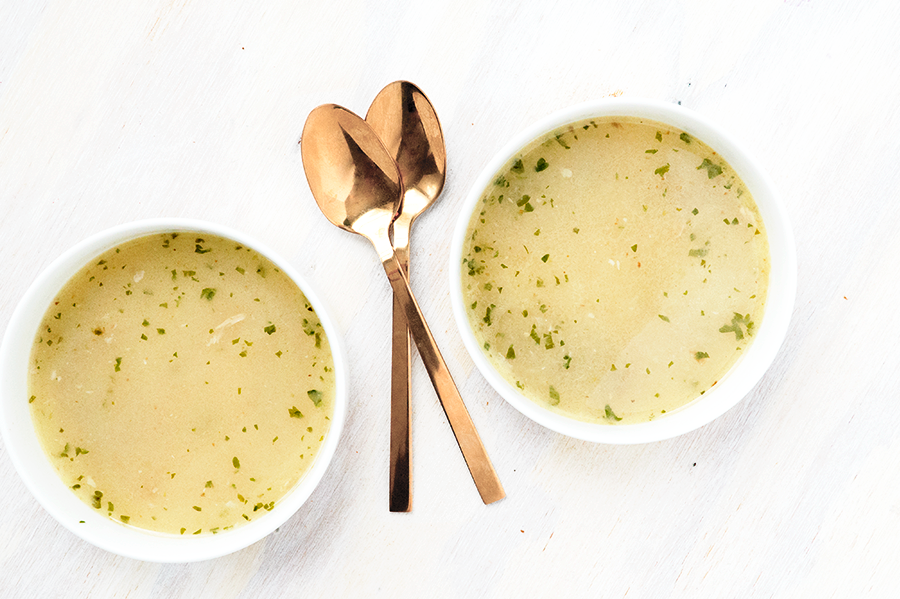
Why Goose?
A Christmas goose used to be a big deal. For anyone who’s ever watched Scrooge, you know that. So why don’t we cook Christmas goose anymore?
For one, it’s hard to find, despite many cities problems with increasing populations of invasive Canadian geese. The once migratory species have started taking up permanent homes in winter climates due to humans feeding them both purposefully and accidentally with our trash.
Some cities have opted to solve two problems with one stone, serving Canadian Geese to homeless populations. See DC, Beverly, Maryland… you get the picture. I’m hoping Denver might catch on?
We skipped the locally raised park selection and instead opted for a purchased Goose, but only because we didn’t know the rules of hunting your own.
In all seriousness, we promote diversity of proteins and animals raised as close to their natural habitat as possible. Wild Canadian geese are grass-fed, grass-finished, pasture-raised animals. And they fit into a diverse diet with multiple sources of proteins, such as Elk, Amaranth, Buffalo, Goose, Kale, Pheasant, Chia Seeds, Salmon, Ling, Quinoa, Halibut, Crickets, Caribou, Nuts, Legumes, Eggs, and so on.
You may also like:
- Keto Bison Bone Broth
- How to Make Bone Broth in 3 steps
- Vegetable Broth
- Bone Broth over Winter Greens
- Pretty in Pink Bone Broth
- Immune Boosting Chicken Veggie Soup
- Cream of Celery (Paleo, DF, GF)
A German Holiday Tradition
This particular Goose was cooked for a German holiday spread from our Cookbook Club using the official cookbook entitled: The German Cookbook. More coming on the recipes from that cookbook soon, but in short the dishes were hearty, full of cabbage, more naturally gluten-free than expected, and delicious.
After serving the goose as the main course, our host didn’t have a use for the leftovers, so I offered to take the remaining goose off of her hands.
This is a great trick by the way! So many folks throw those perfectly nutrient-dense carcasses in the trash and will give them away for free. Bring something that can carry it away, and you’ll have free high-quality broth bones!
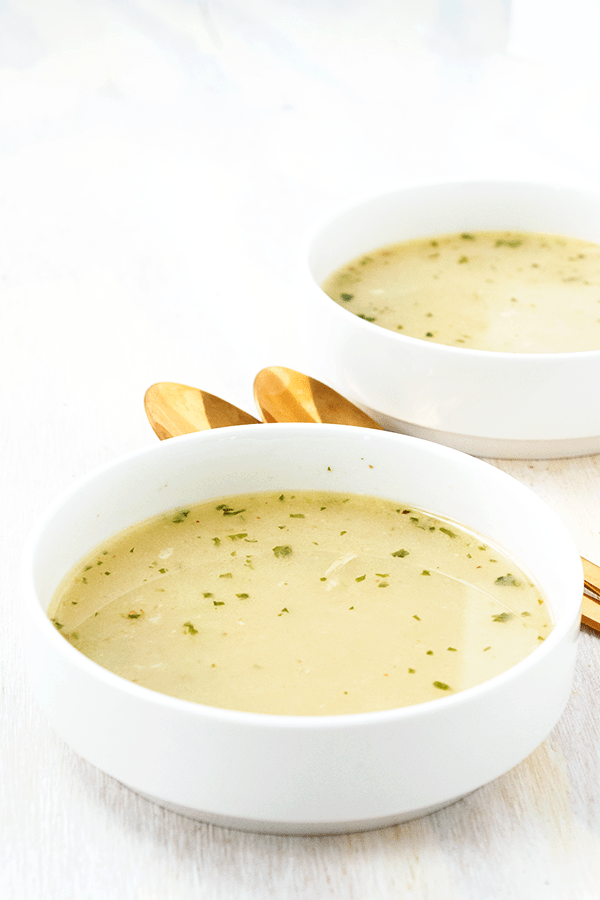
Can I use another bird?
Of course, you can. This recipe was crafted for Goose, but it will be interchangeable with other holiday staples such as Turkey, Quail, Chicken, and Pheasant. Pheasant would work particularly well as it has a similar texture, taste, and size.
Quantities will vary depending on the size of your bird and you may have to adjust the other ingredients to accommodate.
Making the Christmas Goose Stew
Put the leftover goose carcass in the fridge until you’re ready. You can leave the extra meat and skin attached as it will just add to the stew.
When ready, place the goose remains in a large soup pot with a few small garden carrots, three celery ribs, a leftover already boiled full onion, salt, and, of course, love. Fill the pot with cold water, making sure all ingredients are mostly covered.
After turning the stove to very low heat, let the pot sit for 24-36 hours. It will take a long time to come to a simmer and that is ok. The longer it takes to warm up, the more collagen and glutamine you will soak out of the bones. Mine typically doesn’t heat up enough to simmer until about 12 hours in.
However, if you are pressed for time, you can turn it up to medium and bring it to a simmer quicker. It will still taste fantastic and be healthy and nourishing and outshine any canned stalk or powdered bouillon.
For more details about this process, check out my post on how to make a bone broth.
Once you’ve finished simmering the broth, carefully remove all bones and set meat aside. Add one handful of parsley and blend broth, stewed veggies, and parsley with an immersion blender until completely combined. Add back in reserved goose meat, serve and enjoy!
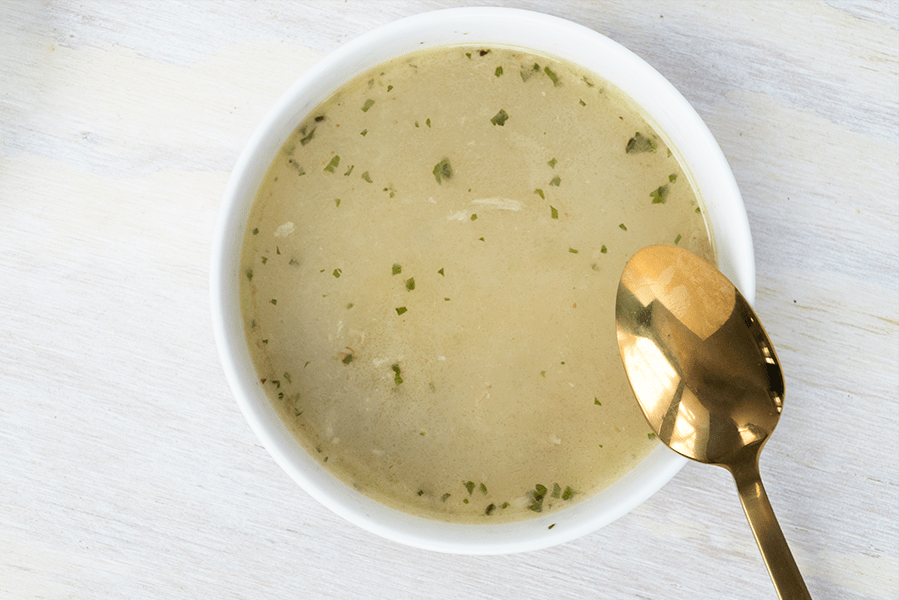
Separating the Broth Bones from the Meat
It’s an unpleasant topic, separating meat from bones, but it makes for the best-tasting soups. You can do this two ways.
- Wrap the entire bird in cheesecloth before adding to the soup. Upon completion, remove cheesecloth with the meat and bones and let cool on a cutting board. Separate bones from meat, discard bones and save meat for adding back to the soup after it’s been blended.
- Skip the cheesecloth. Once the broth is complete, use a slotted spoon to remove the bones and meat from the broth into a bowl. Once cooled, separate and discard the bones, reserving and meat to add back into the blended soup.
Option 1 is best if you plan to serve at high court, to small children, or to anyone adverse to finding bones in their soup.
I use Option 2 because it seems like a waste to use that much cheesecloth and it is difficult to wrap the entire bird in cheesecloth in a manner that will fit into my soup pan. However, I sometimes have a difficult time finding all of the bones. My husband has come to terms with the fact that there may be bones in his soup, but others are less accommodating with my choice here.
Choose the option that is best for you and your dinner guests.
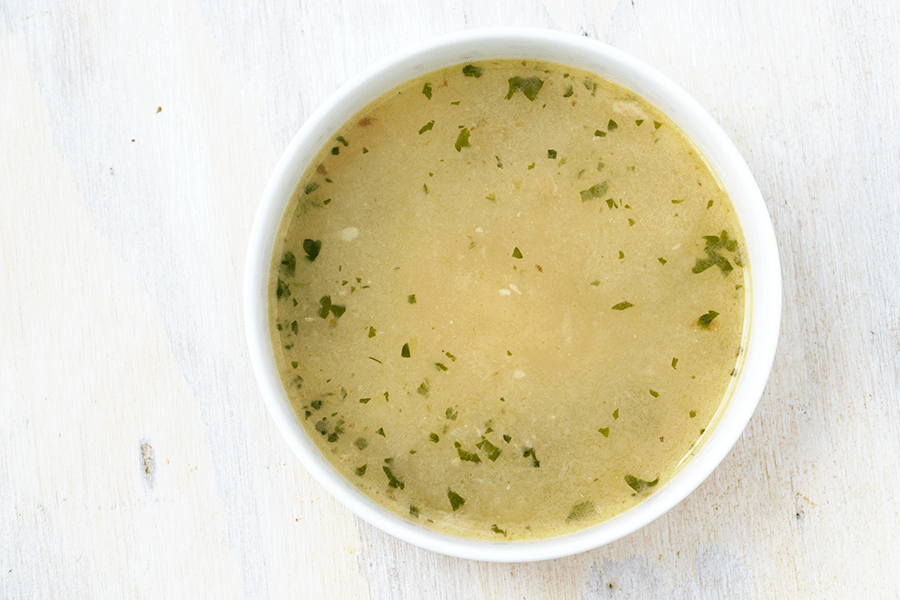
What makes this Christmas Goose Stew Different from your Average bone Broth
Two things set this stew apart:
- this is Goose which is a delicacy and we reserve actual goose meat to add back into the finished stew
- we blend the veggies used to make the broth into the stew, making the broth heartier and thicker with added vegetable nutrition.
I was inspired to blend the veggies back into the stew after reading The Fond Life’s post on blended bone broth. It’s one of those things I feel like I should have thought of. I’ve used the concept hundreds of times to thicken stews in a healthier and more natural way, like in my immune boosting veggie soup, healthy cream of celery soup, or my seafood chowder. I just hadn’t thought of doing it to the broth itself!
I guess I was puritan in that way and I thank Rachel for letting me see the light.
This method of blending the broth-flavoring vegetables back into the broth is great because you get to eat all of that vegetable goodness instead of throwing it out which reduces waste. The blended veggies supply added nutrients and make the soup thicker and creamier so the end result is closer to a full meal rather than clear caldo.
If you haven’t invested in an immersion blender, put it on your gift list! They make this task much easier. However, you can always pour the slightly cooled broth and vegetables into a blender instead to blend instead.
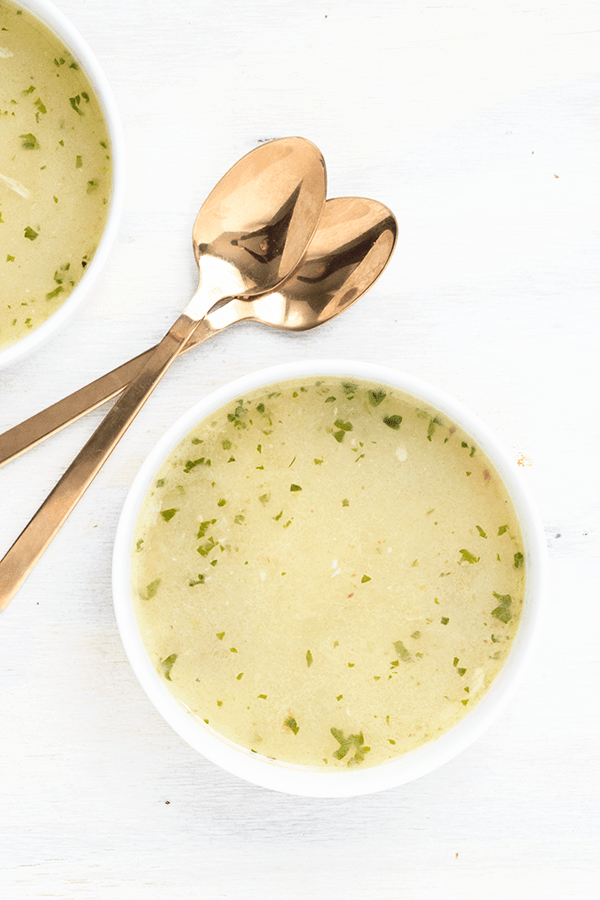
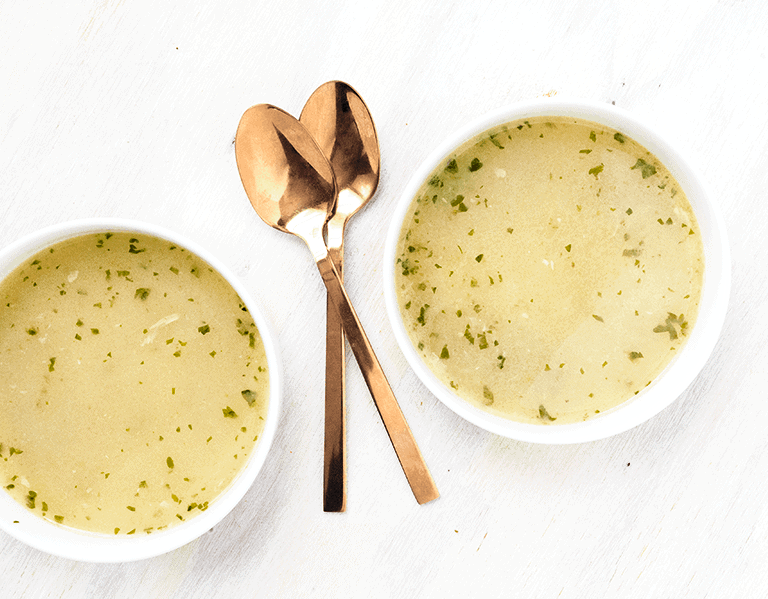
Christmas Goose Stew
Description
A Christmas Goose Stew, made from the broth of vegetables, herbs and a leftover Christmas goose blends bone broth and nutritious vegetables into a wonderful, hearty, and nourishing meal. Paleo, Gluten Free, Whole 30, Game Meat.
Ingredients
Instructions
-
Place Goose carcass in a large soup pot with carrots, celery, onion, and salt.
-
Fill the pot with cold water, making sure all ingredients are covered.
-
Turn the stove to low heat, cover, and let the pot sit for 24-36 hours.
-
Remove and discard bones, saving meat for later.
-
Add parsley. Using an immersion blender, blend broth, vegetables, and parsley until well combined.
-
Add meat back into stew and additional salt to taste
-
Serve and enjoy!
Note
To reduce the chance of bones getting into the soup, you may want to cover the goose in cheesecloth before adding to the pan. After simmering you can remove the entire goose bundle. This allows you to easily separate the bones from the meat. Discard the bones nito an industrial composter if available and add the meat back to the soup after using the immersion blender.



User Reviews